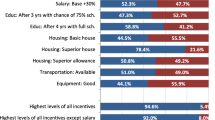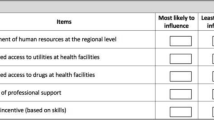Abstract
The policy thrust in Nigeria is to ensure qualified, skilled, and adequate health workforce to achieve universal health coverage. We designed a discrete choice experiment to determine the combinations of incentives that may increase the attraction and retention of frontline health workers. We conducted the study in Bauchi State amongst 145 students and health workers. Health workers are 14.6 and 14.4 times more likely to take up a rural posting or continue to stay in their present rural posts if there was basic housing and improvement of the quality of the facilities respectively. The preference for rural job location increased 6.17 times when good schools for children's education were provided. Ensuring availability of basic housing, improving the quality of health facilities, and ensuring good schools for children’s educations are essential factors that may support attraction and retention of health workers. These strategies will support health care services in rural areas and achieving universal health coverage.
Similar content being viewed by others
References
World Health Organization. Global strategy on human resources for health: workforce 2030; 2016.
World Health Organization. Increasing access to health workers in remote and rural areas through improved retention. Geneva: Global policy recommendations; 2010.
World Health Organization. How to conduct a discrete choice experiment for health workforce recruitment and retention in remote and rural areas: a user guide with case studies. Geneva: WHO Press; 2012.
World Health Organization. Retention of the health workforce in rural and remote areas: a systematic review: web annex A: GRADE evidence profiles; 2020.
Federal Ministry of Health. National Health Policy. Abuja: Federal Ministry of Health; 2016.
Federal Ministry of Health. Second National Strategic Health Development Plan (2018–2022). Abuja: Federal Ministry of Health; 2018.
Federal Ministry of Health. National Human Resources for Health Strategic Plan 2021–2025. Abuja: Federal Ministry of Health; 2020.
Okoroafor S, Ngobua S, Titus M, et al. Applying the workload indicators of staffing needs method in determining frontline health workforce staffing for primary level facilities in Rivers state Nigeria. Glob Health Res Policy. 2019;4:35. https://doi.org/10.1186/s41256-019-0125-z.
Okoroafor SC, Ongom M, Mohammed B, et al. Perspectives of policymakers and health care managers on the retention of health workers in rural and remote settings in Nigeria. J Public Health. 2021;43:i12–9. https://doi.org/10.1093/pubmed/fdaa262.
Okoroafor SC, Ongom M, Mohammed B, et al. Estimating frontline health workforce for primary healthcare service delivery in Bauchi State, Nigeria. J Public Health. 2021;43:i4–11. https://doi.org/10.1093/pubmed/fdaa272.
Okoroafor SC, Ongom M, Salihu D, et al. Retention and motivation of health workers in remote and rural areas in Cross River State, Nigeria: a discrete choice experiment. J Public Health. 2021;43:i46–53. https://doi.org/10.1093/pubmed/fdaa236.
Adeloye D, David RA, Olaogun AA, et al. Health workforce and governance: the crisis in Nigeria. Hum Resour Health. 2017;15(1):1–8.
Aluko JO, Anthea R, Marie Modeste RR. Manpower capacity and reasons for staff shortage in primary health care maternity centres in Nigeria: a mixed-methods study. BMC Health Serv Res. 2019;19(1):10. https://doi.org/10.1186/s12913-018-3819-x.
Okech M, Okoroafor SC, Mohammed B, et al. Human resources for health coordination mechanisms: lessons from Bauchi and Cross River states of Nigeria. J Public Health. 2021;43:i41–5. https://doi.org/10.1093/pubmed/fdaa273.
Okech M, Okoroafor SC, Ojo O, et al. Causes of attrition among frontline health workers in rural areas of Bauchi and Cross River States of Nigeria. J Public Health. 2021;43:i20–6. https://doi.org/10.1093/pubmed/fdaa234.
Oleribe OO, Ezieme IP, Oladipo O, et al. Industrial action by healthcare workers in Nigeria in 2013–2015: an inquiry into causes, consequences and control—a cross-sectional descriptive study. Hum Resour Health. 2016;14(1):1–10.
Zurn P, Zapata T, Okoroafor SC. The importance of strengthening the health workforce in Nigeria to improve health outcomes. J Public Health. 2021;43:i1–3. https://doi.org/10.1093/pubmed/fdab012.
Abimbola S, Olanipekun T, Schaaf M, et al. Where there is no policy: governing the posting and transfer of primary health care workers in Nigeria. Int J Health Plann Manage. 2017;32(4):492–508.
Honda A, Vio F. Incentives for non-physician health professionals to work in the rural and remote areas of Mozambique—a discrete choice experiment for eliciting job preferences. Hum Resour Health. 2015;13(1):1–12.
Mandeville KL, Lagarde M, Hanson K. The use of discrete choice experiments to inform health workforce policy: a systematic review. BMC Health Serv Res. 2014;14(1):1–14.
Robyn PJ, Shroff Z, Zang OR, et al. Addressing health workforce distribution concerns: a discrete choice experiment to develop rural retention strategies in Cameroon. Int J Health Policy Manag. 2015;4(3):169.
Smith S, Deveridge A, Berman J, et al. Task-shifting and prioritization: a situational analysis examining the role and experiences of community health workers in Malawi. Hum Resour Health. 2014;12(1):24. https://doi.org/10.1186/1478-4491-12-24.
World Health Organization. Making pregnancy safer: the critical role of the skilled attendant: a joint statement by WHO, ICM and FIGO: World health organization; 2004.
World Health Organization. Definition of skilled health personnel providing care during childbirth: the 2018 joint statement by WHO: UNFPA, UNICEF, ICM, ICN, FIGO and IPA; 2018.
Lancaster K. A new approach to consumer theory. J Polit Econ. 1966;74:132–57.
Ryan M, Gerard K, Amaya-Amaya M (2008) Discrete choice experiments in a nutshell. In: Ryan M, Gerard K, Amaya-Amaya M (eds) Using Discrete choice experiments to value health and health care. The economics of non-market goods and resources, vol 11. Springer, Dordrecht. https://doi.org/10.1007/978-1-4020-5753-3_1
Penn-Kekana L, Duane B, Khin ST, Desiree M, Jane C. Nursing staff dynamics and implications for maternal health provision in public health facilities in the context of HIV/AIDS," FRONTIERS Final Report 2005. Washington, DC: Population Council.
Dormona F, Balenb J, Schmidtkec KA, Vlaevd I. Healthworkers’ motivation in low and middle-income countries: A systematic review of the literature. Medical Research Archives, 2017; 5 (8).
Orme B. Sample size issues for conjoint analysis studies. Sequim: Sawtooth Software Technical Paper 1998.
Lori JR, Rominski S, Richardson J, et al. Factors influencing Ghanaian midwifery students’ willingness to work in rural areas: A computerized survey. Int J Nurs Stud. 2012;49(7):834–41.
Efendi F, Chen C-M, Nursalam N, et al. How to attract health students to remote areas in Indonesia: a discrete choice experiment. Int J Health Plann Manage. 2016;31(4):430–45. https://doi.org/10.1002/hpm.2289.
Huicho L, Molina C, Diez-Canseco F, et al. Factors behind job preferences of Peruvian medical, nursing and midwifery students: a qualitative study focused on rural deployment. Hum Resour Health. 2015;13(1):90. https://doi.org/10.1186/s12960-015-0091-6.
Lori JR, Moyer CA, Dzomeku V, et al. Achieving universal coverage: understanding barriers to rural placement for final year midwifery students. Midwifery. 2018;58:44–9. https://doi.org/10.1016/j.midw.2017.12.012.
Hanson K, McPake B, Nakamba P, et al. Preferences for hospital quality in Zambia: results from a discrete choice experiment. Health Econ. 2005;14(7):687–701.
Prust ML, Kamanga A, Ngosa L, et al. Assessment of interventions to attract and retain health workers in rural Zambia: a discrete choice experiment. Hum Resour Health. 2019;17(1):26.
Esu EB, Chibuzor M, Aquaisua E, et al. Interventions for improving attraction and retention of health workers in rural and underserved areas: a systematic review of systematic reviews. J Public Health 2021;43:i54–i66. https://doi.org/10.1093/pubmed/fdaa235.
Acknowledgements
The authors wish to express their profound gratitude to the respondents in Bauchi State.
Funding
Funding support was provided by the Government of Canada through Global Affairs Canada through the Enhancing the Ability of Frontline Health Workers to Improve Health in Nigeria Project –A-035024/1.
Author information
Authors and Affiliations
Contributions
All authors meet the ICMJE authorship criteria—SCO and MKO conceived the study. SCO designed the protocol. SCO and CN designed the tools and conducted data collection and analysis. SCO and CN drafted the initial manuscript. SCO, CN and MKO reviewed and approved the final manuscript.
Corresponding author
Ethics declarations
Conflict of interest
The authors declare no conflict of interest.
Ethical approval
Research ethical clearance for this study was obtained from the National Health Research Ethics Committee (NHREC Approval Number NHREC/01/01/2007–12/07/2018) of the Federal Ministry of Health and approval for data collection was obtained from the Bauchi State Ministry of Health.
Additional information
Publisher's Note
Springer Nature remains neutral with regard to jurisdictional claims in published maps and institutional affiliations.
Rights and permissions
About this article
Cite this article
Okoroafor, S.C., Osubor, M.K. & Nwachukwu, C. Factors influencing attraction and retention of frontline health workers in remote and rural areas in Nigeria: a discrete choice experiment. J Public Health Pol 43, 347–359 (2022). https://doi.org/10.1057/s41271-022-00351-z
Accepted:
Published:
Issue Date:
DOI: https://doi.org/10.1057/s41271-022-00351-z




